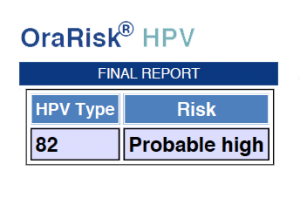
Background: The patient is a 75-year-old female with a history of esophageal cancer in 2013. The origin of the cancer was determined to be lichen planus. Surgical removal of the lesion occurred and no reconstructive surgery was needed. However, post-surgery to present date, the patient experiences severe acid reflux and sleeps with her head elevated. She has great home dental care and follows a 3-month periodontal maintenance. During the head and neck exam, no significant findings were discovered. She indicates being in a monogamous relationship for last 40 years. At the time of her cancer diagnosis in 2013, no education was provided about the Human Papilloma Virus connection to some oral cancers.
Challenge: In 2013, this patient was diagnosed with esophageal cancer and received surgical treatment. A comprehensive oral cancer risk assessment is necessary and recommended for every patient in our practice. OraRisk® HPV completes our comprehensive risk assessment.
Solution: We collected a saliva specimen for OraRisk® HPV on 12/28/2017. Following analysis, the results revealed a positive infection for HPV Type 82. A co-management was proposed to the patients’ primary care provider, ENT and thoracic surgeon at the oncology center, and the results were shared with all parties. Our direction of care at the dental office is to conduct a follow-up retest in June 2018 to establish persistence of the infection. Due to the patient’s history of esophageal cancer and the positive OraRisk® HPV results, all medical providers requested the patient appoint at their respective offices for a check-up. She is to remain on a frequent recall with all offices to ensure anything abnormal is caught early. Once the follow-up retest results are secured, results will be shared.

Additional Notes: Our higher standard of care, when there is a positive OraRisk® HPV, is to retest in 12 months to establish persistence of the infection. A 6-months retest interval was established due to the patient’s recent history of cancer and all health care providers agreed to the 6-month follow-up retest.
Results: This case was a great learning experience on collaborating with medical providers. The thoracic surgeon was intrigued that a dental office was performing this type of screening and oral cancer risk assessment. They were quick to contact the patient and schedule a follow up visit. They were supportive of our proposed 6-month retest interval due to her history. The patient is scheduled for an OraRisk® HPV retest in June 2018.
For more information on how to become an OralDNA Provider – scan HERE: 
- The Co-management of an Esophageal Cancer Survivor - April 16, 2021
- The Co-management of an Esophageal Cancer Survivor - April 20, 2018
- Advancing Patient Care Through the Use of OraRisk® HPV Salivary Testing: An Interview with Camille Luke - April 6, 2018
